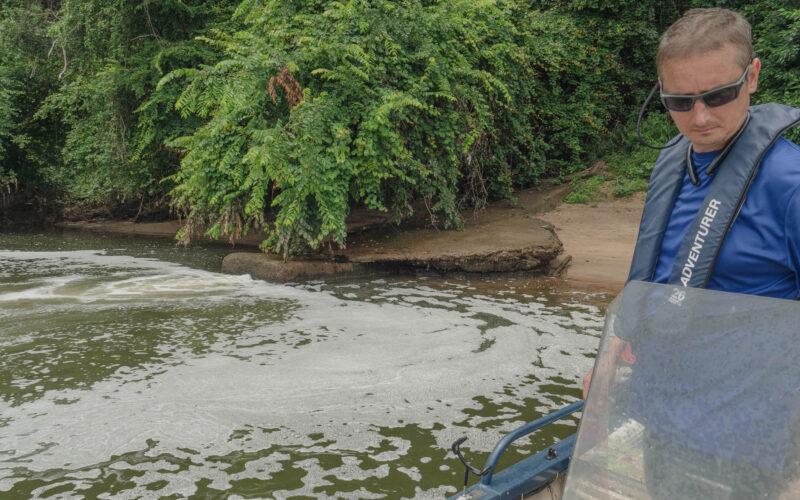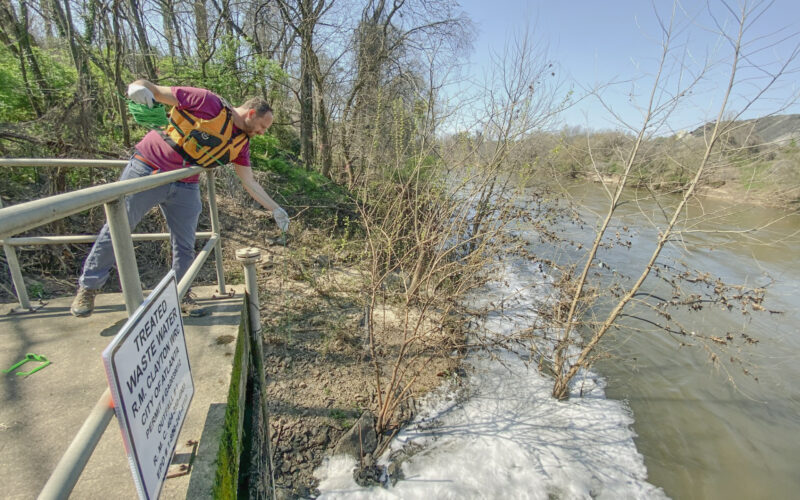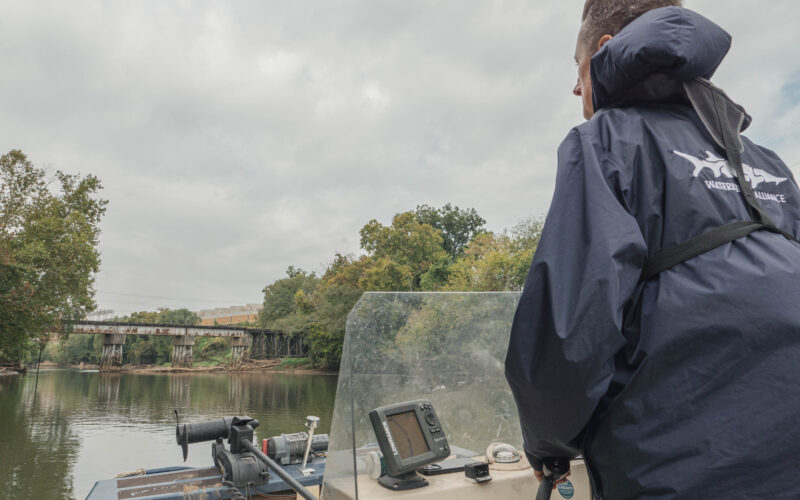On June 29, 2023, results from water quality tests conducted by Chattahoochee Riverkeeper (CRK) revealed dangerously high E. coli bacteria levels in the Chattahoochee River within the Chattahoochee River National Recreation Area (CRNRA). The following day, the National Park Service announced the initial closure of six miles of the river within the CRNRA from the Chattahoochee Nature Center south to Johnson Ferry to protect public health and safety. This was the first time that the National Park Service closed the CRNRA to river recreation since the park was founded in 1978.
CRK tracked the source of the pollution to the Big Creek Water Reclamation Facility (WRF) wastewater discharge in Fulton County. After initially denying that the high bacteria levels were coming from the Big Creek WRF, Fulton County officials admitted that treatment at the Big Creek WRF was failing to fully treat the discharge. As a precautionary measure and based on results from additional water quality testing, the CRNRA expanded the closure of the river to all sections of the river park downstream of the Chattahoochee Nature Center.
CRK and CRNRA staff collected and tested water samples every day throughout the area of concern. We coordinated with Fulton County Public Works, the CRNRA, and affected outfitters. We coordinated and shared data with the Georgia Environmental Protection Division, the state environmental agency with the authority to enforce violations resulting from the treatment failure at Big Creek WRF.
In March 2024 after months of negotiations, EPD finally released a draft Enforcement Order (EPD-WP-9485) for the Big Creek WRF plant failure. CRK believes the Enforcement Order is inadequate because it does not include any requirement for monitoring downstream of the plant to protect public health from another plant failure in the future.
In addition, the draft Environmental Enforcement Order has a paltry fine of $113,600 for 25 violations related to the plant failure and 53 other sewer spills in Fulton County with no connection to the plant’s failure. CRK believes this fine is inadequate based on harm to the river ecosystem and public health. Another recent plant malfunction in metro Atlanta in less than a year suggests the repeat of an old pattern that municipalities may rather pay these minimal fines than abide by the Clean Water Act and protect our water.
Please find additional information regarding the discharge below.
Did the discharge pose a risk to public health?
Water quality testing revealed E. coli bacteria levels almost 300 times higher than the Environmental Protection Agency (EPA) recommended limits for recreation in the area of the CRNRA affected by the spill. These levels posed serious risks to public health, especially for vulnerable populations such as young children, the elderly, and people with weakened immune systems. The CRNRA posted signage at access points along the affected area indicating the closures due to elevated bacteria levels.
Which sections of the river were affected by the discharge?
The CRNRA closed all sections of the river park downstream of Chattahoochee Nature Center (river mile 315.5). On Monday, July 10, the CRNRA announced that the river would reopen from Powers Island to all downstream sections of the river park. On Wednesday, July 19, the CRNRA announced that all sections of the river park were reopened. Water quality tests of the affected sections of the river met EPA recommended levels for recreation. Visit www.nps.gov/CHAT for the latest information on closures within the river park.
The U.S. Army Corps of Engineers released more water than usual from Buford Dam to help dilute the sewage contamination. CRK also collected emergency daily water samples within the CRNRA and areas downstream to understand the impact of the contamination.
Sections of the river upstream of the Chattahoochee Nature Center and as far downstream as West Point Lake should not have been affected by E. coli bacteria contamination resulting from the Big Creek Water Reclamation Facility discharge. CRK conducts weekly water quality testing at sites throughout the Chattahoochee River watershed; these results may be viewed on our website.
Was drinking water affected by the discharge?
Drinking water in Fulton County and the metro Atlanta region was not affected by the spill. All source water is treated to meet drinking water standards.
What caused the sewage discharge?
The source of the sewage contamination was identified as a malfunction at the Big Creek Water Reclamation Facility in Fulton County. It disrupted the water treatment process at the plant, which treats more than 20 million gallons of sewage each day.
The discharge of pollution was a violation of the Clean Water Act. It was reported to the Georgia Environmental Protection Division (EPD).
When did the closed sections of the river reopen?
CRK continued daily sampling and coordinating with the CRNRA to monitor bacteria levels in the water, and the river closure remained in place until water quality data supported reopening. On Monday, July 10, the CRNRA announced that the river would reopen from Powers Island to all downstream sections of the river park. On Wednesday, July 19, the CRNRA announced that all affected sections of the river park were reopened.
On Thursday, July 6, Fulton County officials reported that healthy microorganisms were being trucked in to treat the E. coli contamination in the river and improve water quality. The county reported that the biological process in the treatment facility were improving.
What was the impact of the discharge on wildlife?
Chattahoochee Riverkeeper monitored the impact of the discharge on wildlife. There were no indications of a fish kill as a result of the discharge. During the river park closure, it remained safe to fish sections of the river upstream of the Chattahoochee Nature Center and downstream of West Point Lake.
Last updated March 28, 2024.


